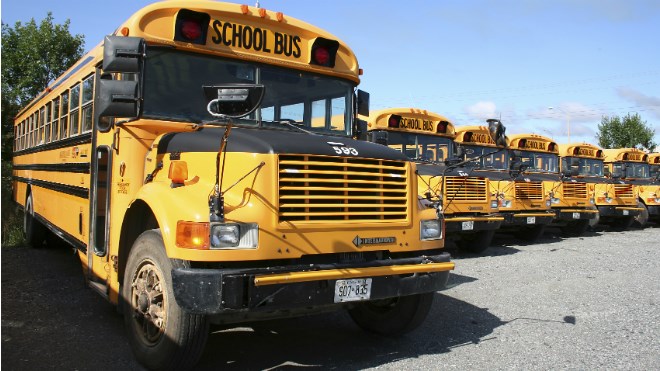With new school bus drivers currently in training to replace those who quit just prior to the start of the school year, the executive director of the Sudbury Student Services Consortium said the issue of route cancellations should get a lot better within a few weeks.
The consortium announced Friday that 14 school bus routes will be cancelled for the week of Sept. 21 due to an ongoing shortage of bus drivers. That’s down from 19 routes this past week, and 25 during the first week of school.
Renee Boucher said Leuschen Transportation, a large local school bus company which has experienced a shortage of drivers, has 16 new people in training.
Their training started a week ago as of Monday, and takes three weeks in total, with requirements including licensing with the MTO and police checks.
“When these new trainees are out and driving, I’m hoping to have enough,” Boucher said, in a phone interview with Sudbury.com last week.
“I’m really hoping that drivers who are there now don’t leave us. It’s very important that they please continue driving our little ones to and from school.”
Given just how much school bus drivers are needed, she said she hopes parents instruct their kids to show the drivers some consideration, and asks that the public show respect for school buses as well. Boucher said she’s heard about members of the public giving school bus drivers the finger.
While school bus companies may eventually get enough regular drivers, Boucher said there still may be route cancellations when drivers become ill -- they aren’t able to drive the bus when exhibiting any of the wide-ranging symptoms of COVID-19.
Boucher said a lot depends on the severity of the upcoming cold and flu season.
The reason behind the shortage of bus drivers locally is that several quit just prior to the school year for reasons related to the pandemic.
First of all, there was a lot of uncertainty, with decisions being made by school boards and government over the summer, and the consortium receiving a list of kids riding the bus at the last minute.
Bus drivers also have new requirements including ensuring kids are in their assigned seats (there didn’t used to be assigned seats on school buses) and cleaning buses twice per day, Boucher said.
They also have to wear masks at all times, and face shields when they’re not driving.
Many drivers are also seniors -- the age group most vulnerable to COVID-19 -- or they may have family members who are seniors or young children they need to protect.
Boucher said school bus companies across the province are also experiencing a shortage of bus drivers.
“Many, many school bus operators across the province do not have enough drivers to cover their routes,” she said.
In a bid to attract more school bus drivers, Leuschen has actually increased its pay for drivers to $20 per hour.
“If anyone does have a few hours during the day, it’s a part-time job,” Boucher said. “You do a morning run, and then you’re off if you need to do something in the middle of the day.
“You’re back into the seat for the afternoon run, and home in the evening as well. You have the March break off, you have the Christmas holidays off, and you have the summers off. So it is a good job for someone who is looking for part-time work.”
Even beyond the shortage of bus drivers, Boucher said there were also a few hiccups related to school bus transportation this month.
In the case of students from multiple schools on a single bus, they were assigned seats based on pickup location.
However, on buses that transport students from a single school only, the consortium assigned seats so as to preserve cohorting by grade, when possible. This was at the request of school boards.
Seat assignments were arranged using a newly-designed app.
Parents, however, weren’t thrilled that in some cases, siblings were not seated next to each other.
Boucher said the consortium is now re-working seating assignments, which will be based solely on pickup location. This should ensure that siblings are seated next to each other.
“It’s something where we’re just asking for parents’ patience,” she said. “We do understand that there are glitches. We understand that for many things in this system this year, because of the delays we have seen, we’re not where we want to be at this point.
“I’m terribly sorry that I’m not where I want to be, where I should be at this time in a regular year, but we do ask parents to please be patient. We are in the middle of a pandemic, we are dealing with very, very last-minute decisions, and very, very new software.”
As of Monday, Sept. 21, the consortium is now requiring all students from junior kindergarten to Grade 12 to wear a mask on the school bus.
Previously, junior kindergarten to Grade 3 students are encouraged, but not required, to wear a mask on the school bus. Exceptions will be allowed for students with health problems or special needs that prevent them from wearing a mask.
Boucher explained in an email to Sudbury.com after the consortium made this policy public on Friday that school bus operators, drivers and many parents had requested that masks be mandatory on school buses since social distancing is not always achieved.
“The consortium therefore decided to mandate masks from all students while on our school buses,” she said in an email.
“Also, the consortium wanted to ensure that all students on our buses realize the importance of wearing and keeping on their masks during the entire bus ride, and this was difficult to enforce when some students did not need to wear one. The consortium will allow face shields and will also accept medical exemptions.”
